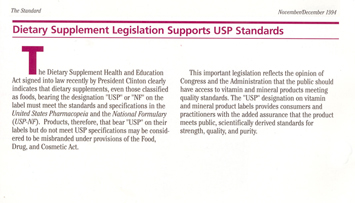DSHEA codified Congressional intent that dietary supplements should be uniquely regulated, not the same as either foods or drugs, but within the framework of food law. Accordingly, manufacturers no longer need to demonstrate that dietary supplements are GRAS (generally recognized as safe) or covered by a food additive regulation to be legally marketed. It also included some provisions for unique health-related claims not available for conventional foods. The regulatory approach provided by DSHEA essentially limits FDA to only taking retroactive action after unsafe products are sold. Moreover, manufacturers may label their supplements with a variety of health support benefits that do not amount to drug claims, as long as the label includes a statement that such claims had not been evaluated by FDA. Unlike the case with drugs, USP's compendial quality standards for dietary supplements only apply, under the food misbranding provision of the FDCA, if supplements are labeled as being USP and fail to meet applicable compendial standards.
To help compensate for what some perceive as a less than robust federal regulatory regime for dietary supplements, USP launched its Dietary Supplements Verification Program in 2001. Featuring voluntary testing and auditing services, the program was developed to help dietary supplement manufacturers ensure the production of quality products. To help consumers identify products that have been verified through this process, USP created the USP Verified Mark, which can be placed only on the labels of products that meet USP's stringent criteria of quality, purity, and potency.


